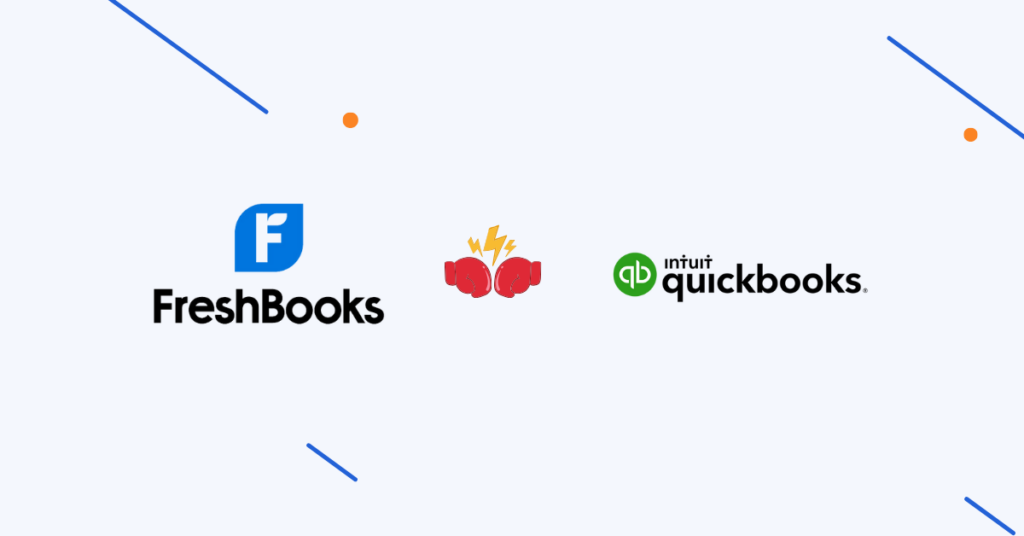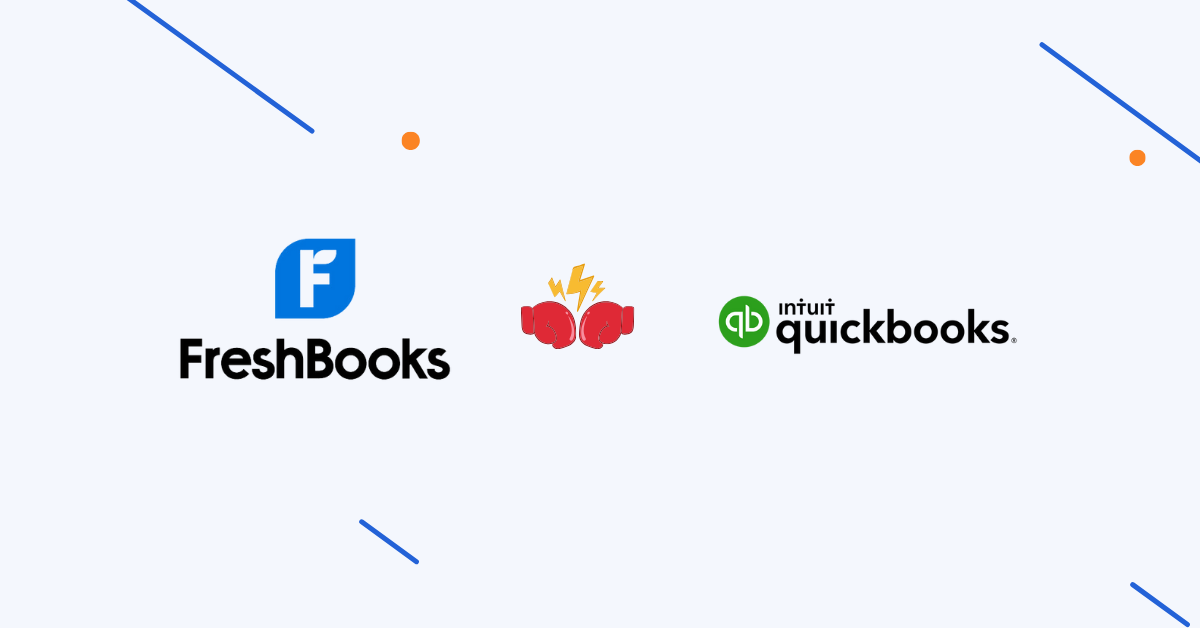FreshBooks can replace QuickBooks for certain businesses, depending on their accounting requirements and size.
But can FreshBooks replace QuickBooks? Many small business owners and freelancers ask this question. FreshBooks and QuickBooks each offer unique features. FreshBooks is known for its user-friendly interface and invoicing tools. QuickBooks is famous for comprehensive accounting capabilities. Deciding between them can be tough.
This blog will explore their differences and similarities. By the end, you will know if FreshBooks can truly replace QuickBooks for your business. Let’s dive into the details.

Credit: www.nav.com
Introduction To Accounting Software
In today’s fast-paced business world, accounting software is essential. These tools help small and large businesses manage finances efficiently. Among the popular choices are FreshBooks and QuickBooks. Both offer unique features, but can FreshBooks really replace QuickBooks? Let’s dive into the details.
Evolution Of Accounting Tools
Accounting has evolved significantly over the years. Initially, businesses used paper ledgers to keep track of transactions. This process was time-consuming and prone to errors. With the advent of computers, electronic spreadsheets like Excel became popular. These tools made accounting faster and more accurate.
Today, dedicated accounting software has taken center stage. Programs like FreshBooks and QuickBooks offer robust features. They automate many tasks, such as invoicing and expense tracking. This reduces manual work and minimizes errors.
| Era | Tool | Features |
|---|---|---|
| Pre-Digital | Paper Ledgers | Manual entry, error-prone |
| Early Digital | Spreadsheets | Faster, more accurate |
| Modern | Accounting Software | Automated, feature-rich |
Importance Of Choosing The Right Software
Choosing the right Accounting Software is crucial for your business. The right tool can save time and money. It can also provide valuable insights into your financial health.
Consider the following factors when choosing accounting software:
- Ease of Use: The software should be user-friendly.
- Cost: It should fit within your budget.
- Features: Look for features that meet your business needs.
- Support: Reliable customer support is essential.
Both FreshBooks and QuickBooks offer a range of features. FreshBooks is known for its simplicity and ease of use. QuickBooks offers more advanced features for larger businesses. Understanding your needs will help you make the right choice.
Quickbooks Overview
FreshBooks offers intuitive invoicing and expense management. QuickBooks, on the other hand, provides comprehensive accounting features. Can FreshBooks replace QuickBooks? It depends on your business needs and accounting complexity.
QuickBooks is a popular accounting software that helps manage finances. It is designed for small and medium-sized businesses. Many businesses use QuickBooks to track expenses, create invoices, and generate reports. Let’s explore its features and who should use it.
Key Features
QuickBooks offers a wide range of features to meet business needs. Here are some key features:
- Invoicing: Create and send professional invoices.
- Expense Tracking: Track and categorize expenses.
- Payroll: Manage employee payroll and tax filings.
- Reporting: Generate financial reports to understand your business.
- Time Tracking: Track billable hours for accurate invoicing.
- Inventory Management: Monitor inventory levels and costs.
- Multi-User Access: Allow multiple users to access the account.
Target Audience
QuickBooks is ideal for a variety of businesses. Here are some target audiences:
- Small Businesses: Perfect for small businesses with limited budgets.
- Medium-Sized Businesses: Suitable for growing businesses needing more features.
- Freelancers: Helps freelancers manage their finances efficiently.
- Service-Based Businesses: Ideal for businesses that provide services rather than products.
- Non-Profits: Assists non-profits in managing donations and expenses.
Overall, QuickBooks provides comprehensive tools for managing business finances. It caters to various business types and sizes, making it a versatile choice.
Freshbooks Overview
FreshBooks is a cloud-based accounting software designed for small businesses and freelancers. It simplifies accounting tasks, making it easier to manage finances. FreshBooks offers a variety of features to help with invoicing, expense tracking, and more. This overview will dive into the key features and target audience of FreshBooks.
Key Features
FreshBooks stands out with its user-friendly interface. Here are some key features:
- Invoicing: Create professional invoices quickly. Customize templates to fit your brand.
- Expense Tracking: Track expenses effortlessly. Snap photos of receipts and log them instantly.
- Time Tracking: Log hours worked. Use the timer to track billable hours.
- Reports: Generate financial reports. Get insights into your business’s performance.
- Payments: Accept online payments. Get paid faster through FreshBooks Payments.
- Project Management: Collaborate with team members. Manage projects efficiently.
These features make FreshBooks a strong contender for small businesses. The software automates many tasks, saving time and reducing errors.
Target Audience
FreshBooks is ideal for small business owners and freelancers. It’s perfect for those who need simple, effective accounting tools. Key target groups include:
- Freelancers: Manage invoices, track time, and handle expenses.
- Small Business Owners: Simplify financial tasks and generate reports.
- Consultants: Bill clients accurately. Track hours worked on projects.
- Service-Based Businesses: Manage client payments and project costs.
FreshBooks caters to those with limited accounting knowledge. The platform is easy to use and offers customer support.
If you run a small business or freelance, FreshBooks could be a great fit. Its features are designed to make accounting simple and stress-free.
User Interface Comparison
Choosing the right accounting software for your business is crucial. The user interface plays a key role in this decision. Let’s compare the user interface of FreshBooks and QuickBooks.
Ease Of Use
Both FreshBooks and QuickBooks aim to provide an intuitive experience. FreshBooks has a clean, modern design. It features a dashboard that offers quick access to key functions like invoicing and expenses.
QuickBooks, on the other hand, has a more traditional layout. While it is comprehensive, it can feel cluttered. Users might find it overwhelming at first glance.
Here’s a quick comparison:
| Feature | FreshBooks | QuickBooks |
|---|---|---|
| Dashboard | Simple and clean | Detailed but cluttered |
| Navigation | Easy to navigate | Requires familiarity |
| Access to functions | Quick access | Multiple clicks needed |
Learning Curve
The learning curve is another important factor. FreshBooks is designed for small business owners. It focuses on simplicity. New users can quickly understand how to use it without much training.
QuickBooks is powerful and feature-rich. This comes with a steeper learning curve. Users often need tutorials and training to fully utilize its capabilities.
Here’s a breakdown:
- FreshBooks: Quick onboarding, minimal training needed.
- QuickBooks: Requires more time to master, extensive features.
In summary, if you prefer a straightforward and easy-to-use interface, FreshBooks might be the better choice. For those who need advanced features and don’t mind a steeper learning curve, QuickBooks could be more suitable.
Pricing And Plans
Choosing accounting software can be challenging. Pricing and plans play a big role. Let’s dive into the pricing details of FreshBooks and QuickBooks.
Cost Comparison
FreshBooks and QuickBooks offer different pricing plans. Both cater to various business needs. Here’s a comparison of their basic plans:
| Feature | FreshBooks | QuickBooks |
|---|---|---|
| Starting Price | $15/month | $25/month |
| Users | 1 user | 1 user |
| Invoicing | Unlimited | Unlimited |
| Expenses | Unlimited | Limited |
| Reports | Basic | Basic |
Value For Money
FreshBooks offers more features in their basic plan. Their plan starts at $15/month. QuickBooks starts at $25/month. FreshBooks provides unlimited invoicing and expenses. QuickBooks limits expense tracking in their basic plan.
If you need to add more users, FreshBooks charges $10/user/month. QuickBooks charges $5/user/month. For small businesses, FreshBooks offers better value. Their features and pricing are more competitive.
Both platforms offer higher-tier plans. These include advanced features. Consider your business needs before choosing a plan. FreshBooks and QuickBooks both offer free trials. Try them out before committing.

Credit: vencru.com
Customer Support
Customer support is a crucial factor in choosing accounting software. Both FreshBooks and QuickBooks offer extensive support options. Understanding their support channels and response times can help you make an informed decision.
Support Channels
FreshBooks offers various support channels to assist users. These include:
- Email support
- Phone support
- Live chat
- Comprehensive knowledge base
- Community forums
QuickBooks also provides multiple support channels. These consist of:
- Email support
- Phone support
- Live chat
- Extensive knowledge base
- Community forums
Both platforms offer a range of options, ensuring users can get help in various ways.
Response Time
Response time is another important aspect of customer support. FreshBooks typically responds within:
- 24 hours for email inquiries
- Immediate responses via phone and live chat during business hours
QuickBooks offers similar response times:
- 24-48 hours for email support
- Instant responses via phone and live chat within business hours
The speed of response can make a significant difference in resolving issues quickly. Both platforms aim to provide timely assistance, enhancing the user experience.
Integration Capabilities
Businesses need accounting software that integrates with other tools. Both Freshbooks and Quickbooks offer diverse integration options. Let’s explore their integration capabilities under two main aspects.
Third-party Apps
Both Freshbooks and Quickbooks support many third-party apps. These integrations help enhance functionality.
Freshbooks integrates with over 100 popular apps. This includes payment gateways, CRM systems, and project management tools. Here are a few notable ones:
- PayPal
- Stripe
- Shopify
- Slack
Quickbooks, on the other hand, has an extensive list of integrations. It supports over 650 apps. Some of the key integrations include:
- Square
- Bill.com
- Expensify
- Trello
Ecosystem Compatibility
Compatibility with various ecosystems is crucial for smooth operations.
Freshbooks works well within the Apple ecosystem. It supports iOS apps and macOS. Users can access Freshbooks on iPads, iPhones, and Macs.
Quickbooks offers broader compatibility. It works seamlessly on Windows, macOS, iOS, and Android. This makes it accessible across different devices and platforms.
Here’s a quick comparison:
| Feature | Freshbooks | Quickbooks |
|---|---|---|
| Supported Platforms | iOS, macOS | Windows, macOS, iOS, Android |
| Number of Integrations | 100+ | 650+ |
Both Freshbooks and Quickbooks have strong integration capabilities. The choice depends on your specific needs.
User Reviews And Feedback
Understanding user reviews and feedback is crucial when evaluating Freshbooks and Quickbooks. Both software solutions have a strong user base with varied experiences. This section explores what users have to say about these platforms.
Pros And Cons
| Aspect | Freshbooks | Quickbooks |
|---|---|---|
| Ease of Use | Simple and intuitive | Steep learning curve |
| Customer Support | Highly praised | Mixed reviews |
| Features | Good for small businesses | Comprehensive, many features |
| Pricing | Affordable | More expensive |
Common Complaints
- Freshbooks: Limited advanced features for large businesses.
- Quickbooks: Complex interface and higher cost.
Users often mention Freshbooks is great for small businesses. But it lacks advanced features for larger enterprises. On the other hand, Quickbooks users report a complex interface. They also note the higher cost compared to Freshbooks.
Final Verdict
Deciding between FreshBooks and QuickBooks depends on your specific needs. Each software has its strengths and weaknesses.
Best For Small Businesses
FreshBooks is often the preferred choice for small businesses. It offers a user-friendly interface and simple invoicing features. Its time-tracking and expense management tools are straightforward. FreshBooks also provides excellent customer support. Small businesses with limited accounting knowledge will find it easy to use.
| Feature | FreshBooks | QuickBooks |
|---|---|---|
| Ease of Use | Very Easy | Moderate |
| Customer Support | Excellent | Good |
| Invoicing | Simple | Advanced |
Best For Large Enterprises
QuickBooks is better suited for large enterprises. It offers advanced accounting features and integrations. QuickBooks handles complex financial reporting and payroll management. Its scalability makes it ideal for growing companies. Enterprises that need detailed financial analysis benefit from QuickBooks.
- Advanced Reporting
- Payroll Management
- Inventory Tracking
- Scalability
Choose QuickBooks if your business needs these advanced features.

Credit: vencru.com
Frequently Asked Questions
Can Freshbooks Replace Quickbooks For Small Businesses?
FreshBooks can replace QuickBooks for small businesses. It offers user-friendly features like invoicing, expense tracking, and time management.
Is Freshbooks Easier To Use Than Quickbooks?
FreshBooks is considered easier to use than QuickBooks. Its interface is intuitive and user-friendly, ideal for beginners.
Does Freshbooks Offer Better Customer Support?
FreshBooks offers excellent customer support. Users often praise its quick response times and helpful representatives.
Can Freshbooks Handle Payroll Like Quickbooks?
FreshBooks does not handle payroll directly. However, it integrates with third-party payroll services to manage this function.
Conclusion
Choosing between FreshBooks and QuickBooks depends on your needs. FreshBooks offers simplicity. Great for freelancers and small businesses. QuickBooks provides advanced features. Better for larger businesses or those with complex needs. Both have their strengths. Consider your business size and accounting needs.
Test both if unsure. Make an informed decision. Your choice impacts your financial management.






